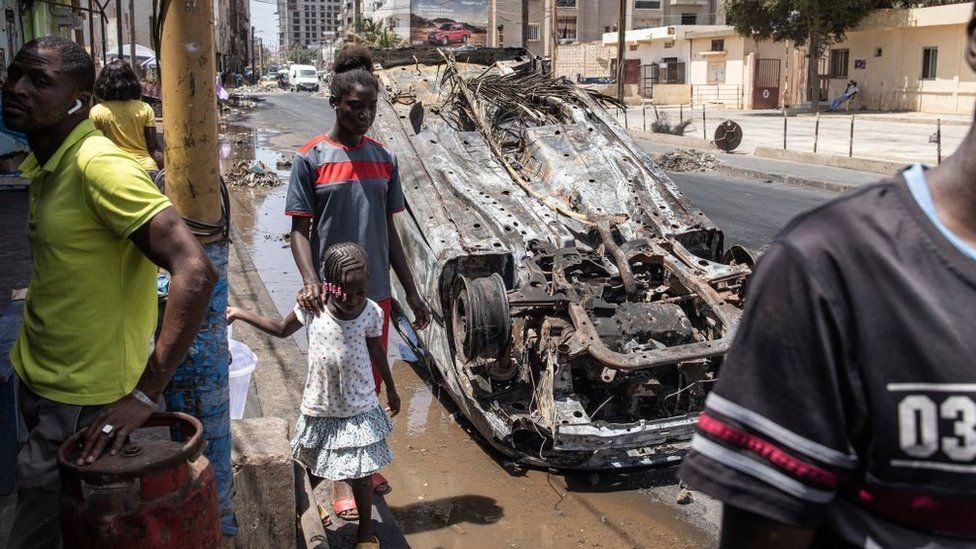
This article is more than
2 year old
Political analyst Alioune Tine compared his decision to "deactivating a bomb", pointing out that popular opposition politician Ousmane Sonko had threatened a new wave of mass protests if Mr Sall ran for a controversial third term.
The 61-year-old president's announcement, in a much-awaited television address on Monday night, caught many people by surprise.
Momentum had been building within his ruling party for him to seek re-election, with an overwhelming majority of its public representatives - including lawmakers and mayors - asking him to lead them into next year's poll.
Many of his supporters who were around the presidential palace in the capital, Dakar, were in tears when he announced his decision.
"I have a clear awareness and memory of what I have said, written and repeated, here and elsewhere, namely that the 2019 term was my second and final term. I have a code of honour and a sense of historical responsibility that compels me to stand by my dignity and my word," Mr Sall said.
But his critics hold a different view, pointing out that Mr Sall had infamously said in French "ni oui, ni non" (neither yes nor no) when journalists asked him soon after the 2019 election whether or not he would run for office again in 2024.
This was highly controversial as Senegal's supreme law - the constitution - bars a president from running for more than two terms. But Mr Sall's camp had been arguing - until just a few days ago - that his first term did not count as the current constitution was only adopted in his second term.
Sources close to the presidential palace told the BBC that some of Mr Sall's advisers - as well as relatives, who had gained top posts in state companies under his rule - had urged him to seek re-election. They feared a new president would remove them from their posts, and they would also lose economic benefits at a time when Senegal's fledgling oil and gas industry was expected to grow.
For the opposition, the thought of Mr Sall, and his hangers-on, remaining in power was anathema, especially as they believed that his government was becoming increasingly authoritarian.
Mr Sonko - who is currently under house arrest - rallied his mostly young supporters against Mr Sall, resulting in the deaths of at least 16 people in clashes with the security forces since March.
Ahead of Mr Sall's address, Mr Sonko made a new call on "all the Senegalese people to stand up, [and] to face him" if he ran for a third term.

Mr Sall appeared to have finally bowed to the pressure, saying he wanted to "preserve the image of democracy, stability... that Senegal has internationally".
His decision is in sharp contrast to that of some of the other leaders in the region.
In Ivory Coast, President Alassane Ouattara won a controversial third term in 2020. The poll was boycotted by the opposition, which argued that his candidacy violated the constitution.
In Togo, President Faure Gnassingbé is currently in his fourth term after the constitution was amended, dropping a two-term limit.
Against this backdrop, some political analysts believe that Mr Sall has prevented democracy from sliding backwards in his country, with African Union Commission chairman Moussa Faki among those who praised his decision not to seek a third term.
But Senegal's former Prime Minister Aminata Touré said that Mr Sall had not made a "heroic move".
"He is just applying the constitution. He should have said that the minute he got re-elected in 2019. This would have saved the country all the turmoil and the trouble we went through," she added.